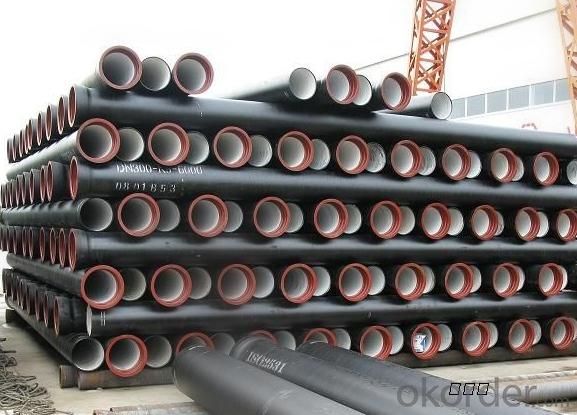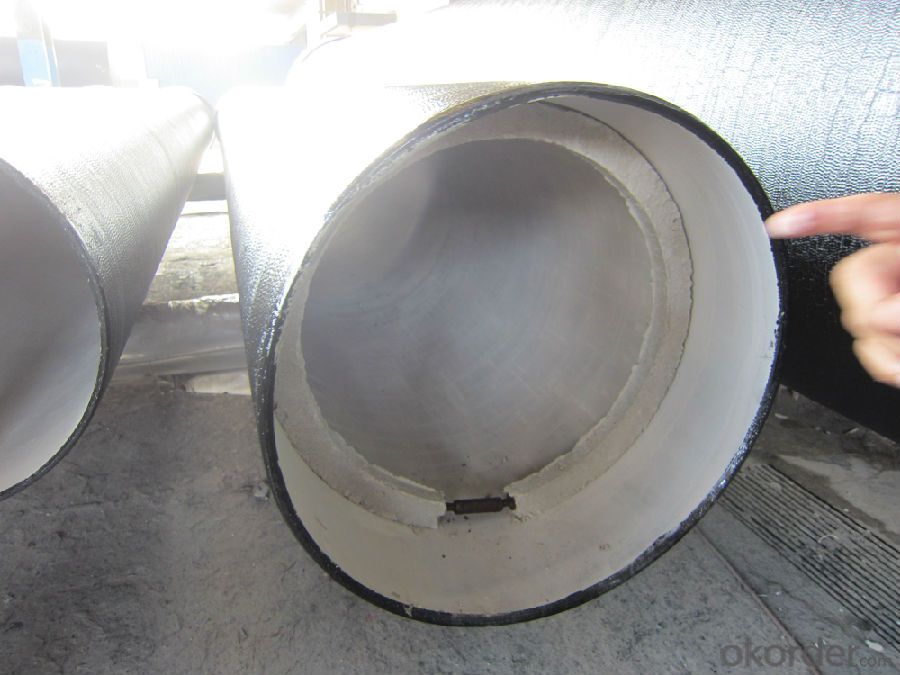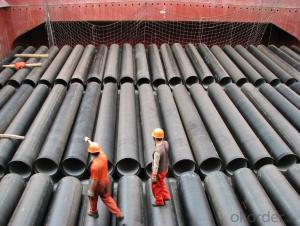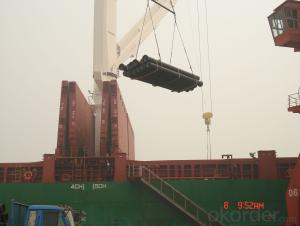Ductile Iron Pipe DN80-DN1000 K9 EN545
- Loading Port:
- China main port
- Payment Terms:
- TT or LC
- Min Order Qty:
- 23 m.t.
- Supply Capability:
- 200000 m.t./month
OKorder Service Pledge
OKorder Financial Service
You Might Also Like
1,Ductile Iron Pipe Description :
1) Pipes confirm to ISO2531,K9 class,T type joint,6m long,with inside cements lining conform to ISO4179, outside Zinc spraying(130g/m2) and bitumen coating(70μm) conform to ISO8179.
2) Pipe ends: Spigot and socket ends, with 100% SBR rubber gaskets accoding to ISO4633
3) we can do third party inspection according to customer's request.
2,Main Features of the Ductile Iron Pipe:
1. Material: Ductile iron grade 500-7/ 450-10 in accordance with ISO1083
2. Standard: ISO 2531, EN545, EN598, ANSI, AWWA
3. Certificate: ISO9001, ISO14001, SGS, NSF, WRAS
4. Test: In accordance with ISO 2531 / EN 545 / EN598 and 100% water pressure test
5. Length: 6m or cut into 5.6m, 5.7m, 5.8m
6. Internal Lining: Cement, conform to ISO4179
7. External coating: Zinc + Bitumen, conform to ISO8179
8. Rubber: NBR, SBR, EPDM according to ISO4633 / EN681.1
9. Note: The gaskets, bolts & nuts are supplied respectively as your special requirement
10Packing and Shipping:standard export package(carton/wooden case/pallet)
accept FOB,FAS,CNF,CIF door to door etc or customer designated shipping agent
11.Service:Drawing: we can translate your original drawing, offer best suggestion on design
Quality: we have full set quality control system to guarantee the best quality.
Inspection: inspect in house, all our products must be checked 3 times before packing
3,Ductile Iron Pipe Images:


4. Ductile Iron Pipe Specification:
Surface Finishes: Bare, Oiled, Mill Varnish, Galv,FBE, FBE Dual, 3LPE, 3LPP, Coal Tar,Concrete Coating and Tape Wrap
End Finishes: Beveled, Square Cut, Threaded, hat
Additional Services: Internal Coating
Packaging: packed in bag, plastic bag, steel strip, steel wire,double wire, iron box, wooden box, tarpaulin, plastic sheeting
Test: X-ray, UT, magnetic particle,inspection,hydrostatic test.
Processing service: Beveling, Threading, Slotting, Cut-to length, Bends, Quench and Temper, Fabrication, Double-jointing and On-site assistance
Documentary: MTC, material certification,Origin certification, CI or PI,Test Report, export licence, handling order, B/L,insurance policy,shipping instructions, contract, packing list etc.
5.FAQ:
We have organized several common questions for our clients,may help you sincerely:
1.Q: Why would you choose ductile iron pipe rather than other pipe materials?
A:The reasons are obvious for that not only ductile iron pipe possesses the inherent strength and flexibility of ductile iron, combined with proven corrosion protection systems, but also the cost savings can be achieved from design to installation and commissioning.
2.Q:Why can you guarantee the inner of pipes can’t be corroded?
A: High alumina cement mortar lining and sulphate-resistant cement mortar lining. These two special linings are applicable to inner anti-corrosion for sewage pipes, improving resistance to erosion of the sewage components.
- Q:The difference between ductile cast iron pipe and machine-made cast iron pipe
- Different appearance, ductile iron pipe single length of 6 meters, large wall thickness; mechanism cast iron pipe single length of 3 meters, the wall thickness is thin.
- Q:How do ductile iron pipes handle thermal expansion and contraction?
- Ductile iron pipes are known for their excellent ability to handle thermal expansion and contraction. This is mainly due to their unique composition and design which allows them to withstand changes in temperature without experiencing significant damage or deformation. Thermal expansion occurs when a material expands due to an increase in temperature, while thermal contraction refers to the contraction that occurs when a material cools down. Ductile iron pipes can effectively accommodate these changes in temperature by utilizing their inherent flexibility and strength. One of the key factors that enable ductile iron pipes to handle thermal expansion and contraction is their high ductility, which refers to their ability to deform without breaking. This ductility allows the pipes to absorb the expansion and contraction forces without cracking or rupturing. Moreover, the composition of ductile iron pipes includes graphite nodules, which act as microcracks that can absorb stress and prevent the material from fracturing. This unique microstructure enhances the pipes' resistance to thermal expansion and contraction. In addition, ductile iron pipes are often designed with joints that allow for limited movement. These joints, such as mechanical joints or push-on joints, can accommodate the expansion and contraction of the pipes by providing a certain degree of flexibility. This helps to prevent the pipes from becoming overstressed or damaged. Overall, ductile iron pipes are specifically engineered to handle thermal expansion and contraction effectively. Their high ductility, unique microstructure, and joint design make them a durable and reliable choice for applications where temperature variations are expected.
- Q:Can ductile iron pipes be used for water distribution networks in rural areas?
- Yes, ductile iron pipes can be used for water distribution networks in rural areas. Ductile iron pipes have excellent strength and durability, making them suitable for various applications, including water distribution. They can withstand high pressure, provide a long service life, and have good resistance to corrosion and external stresses. Additionally, ductile iron pipes are relatively cost-effective and require minimal maintenance, making them a reliable choice for water distribution networks in rural areas.
- Q:There are several forms of flexible interfaces for Spigot Cast Iron Pipes
- At present, the flexible interfaces include slip type rubber ring interface, R rubber ring interface, flexible mechanical interface, A type and flexible mechanical interface, K type.1. slip in rubber ring interfaceRubber ring and pipe are supplied by supply factory. A rubber ring is installed before the socket in the working surface and no tower water supply equipment Jack working surface cleaned, the rubber ring embedded concave socket tip in the rubber ring, and the exposed surface and the socket of the working face, coated with lubricant has no influence on the quality of the rubber ring. The water supply equipment socket end chamfering and rubber ring even after contact with special tool socket socket will push, push people to mark depth should be set in advance, before the festival, before the two push interface depth and review has been.
- Q:Are ductile iron pipes suitable for pressure sewer systems?
- Ductile iron pipes, known for their high strength and durability, are a suitable option for pressure sewer systems. They have been widely used in various applications, including pressure sewer systems, due to their ability to withstand high pressure and provide a long-lasting solution for transporting sewage under pressure. One key advantage of ductile iron pipes is their excellent corrosion resistance, which is crucial in sewer systems where they are exposed to various chemicals and contaminants. These pipes are resistant to both internal and external corrosion, ensuring their durability and functionality over time. Moreover, ductile iron pipes have a smooth internal surface, minimizing friction and improving the flow capacity of the sewer system. This feature allows the pipes to handle the required flow rates and prevent blockages or backups. Additionally, ductile iron pipes are known for their ease of installation. They can be easily cut and joined using various methods, making them a convenient choice for pressure sewer systems. Overall, ductile iron pipes offer a reliable choice for pressure sewer systems, thanks to their high strength, corrosion resistance, smooth internal surface, and ease of installation.
- Q:What is the composition of ductile iron pipes?
- Ductile iron pipes consist mainly of iron, with small amounts of carbon, silicon, and other alloying elements. The iron content typically ranges from 90% to 94%, while carbon content is usually around 3% to 4%. Silicon is added between 1.5% to 3%, which enhances the ductility and strength of the iron. Smaller quantities of manganese, sulfur, and phosphorus may also be present. The composition of ductile iron pipes is carefully engineered to achieve specific properties. By adding carbon and silicon, the hardness and strength of the iron are improved, making it suitable for demanding applications. These alloying elements also contribute to the pipes' ductility, allowing them to be easily bent and molded without breaking. In summary, the composition of ductile iron pipes is designed to strike a balance between strength, ductility, and resistance to corrosion. This makes them ideal for use in water and sewage systems, where they can endure high pressure, bear heavy loads, and resist the corrosive effects of water and other chemicals.
- Q:Can ductile iron pipes be used for trenchless installation methods?
- Yes, ductile iron pipes can be used for trenchless installation methods. Trenchless installation methods, such as horizontal directional drilling or pipe bursting, allow for the installation of pipes without the need for extensive excavation. Ductile iron pipes are known for their strength, durability, and flexibility, making them suitable for these trenchless methods. Additionally, ductile iron pipes have excellent resistance to corrosion and can withstand high-pressure conditions, further enhancing their suitability for trenchless installation.
- Q:Can ductile iron pipes be used for water tunnel crossings?
- Indeed, water tunnel crossings can utilize ductile iron pipes. Renowned for their robustness, longevity, and immunity to corrosion, ductile iron pipes prove to be an ideal option for diverse purposes, including water tunnel crossings. Their ability to endure immense pressure, external burdens, and soil movements, commonly experienced in tunnel crossings, is commendable. Moreover, ductile iron pipes boast an extended lifespan and necessitate minimal upkeep, rendering them an economical resolution for water tunnel crossings.
- Q:Can ductile iron pipe be recycled?
- Indeed, the recycling of ductile iron pipe is possible. Ductile iron, a variant of iron often employed in pipe production owing to its remarkable robustness and endurance, can be melted down when it reaches the conclusion of its productive lifespan. By utilizing the resultant molten iron, fresh items can be fashioned. This method of recycling not only aids in the preservation of precious natural resources but also lessens the necessity for raw materials and energy-intensive procedures utilized in the fabrication of novel pipes. Furthermore, the recycling of ductile iron pipe serves to diminish waste and contributes to a more sustainable and ecologically conscious approach to the advancement of infrastructure.
- Q:Can ductile iron pipes be used for drainage systems in airports?
- Yes, ductile iron pipes can be used for drainage systems in airports. Ductile iron pipes are known for their strength, durability, and resistance to corrosion, making them suitable for various applications, including drainage systems. They can effectively handle the high flow rates and heavy loads typically associated with airports, ensuring efficient drainage and preventing water accumulation on runways, taxiways, and other areas.
1. Manufacturer Overview |
|
|---|---|
| Location | |
| Year Established | |
| Annual Output Value | |
| Main Markets | |
| Company Certifications | |
2. Manufacturer Certificates |
|
|---|---|
| a) Certification Name | |
| Range | |
| Reference | |
| Validity Period | |
3. Manufacturer Capability |
|
|---|---|
| a)Trade Capacity | |
| Nearest Port | |
| Export Percentage | |
| No.of Employees in Trade Department | |
| Language Spoken: | |
| b)Factory Information | |
| Factory Size: | |
| No. of Production Lines | |
| Contract Manufacturing | |
| Product Price Range | |
Send your message to us
Ductile Iron Pipe DN80-DN1000 K9 EN545
- Loading Port:
- China main port
- Payment Terms:
- TT or LC
- Min Order Qty:
- 23 m.t.
- Supply Capability:
- 200000 m.t./month
OKorder Service Pledge
OKorder Financial Service
Similar products
New products
Hot products
Related keywords



























